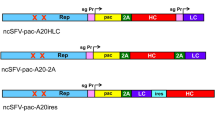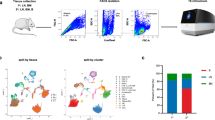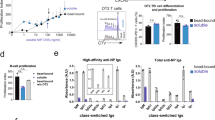Abstract
The existence of shared idiotypic determinants on the surfaces of T and B cells is now firmly established, suggesting that on both these cell types immunoglobulin variable regions are expressed which presumably function as antigen receptors. In most systems this has been inferred through the use of anti-idiotypic antibody instead of antigen to induce either helper or suppressor T cells1,2. Recent evidence demonstrates that antigen-specific suppressor or helper factors can also bear idiotypic determinants3,4. It is possible that these factors represent released receptors or portions of receptors. We show here the direct elimination of an antigen-induced T-suppressor population by an anti-idiotypic serum and complement. These suppressor T cells as well as the idiotypic population used to generate the antiserum are each specific for the same limited portion of the multi-determinant antigen, lysozyme. Apparently, these suppressor cells are restricted in specificity as well as share idiotypy with antibodies of the same specificity.
This is a preview of subscription content, access via your institution
Access options
Subscribe to this journal
Receive 51 print issues and online access
$199.00 per year
only $3.90 per issue
Buy this article
- Purchase on Springer Link
- Instant access to full article PDF
Prices may be subject to local taxes which are calculated during checkout
Similar content being viewed by others
References
Eichmann, K. Eur. J. Immun. 5, 511–517 (1975).
Eichmann, K. & Rajewsky, K. Eur. J. Immun. 5, 661–666 (1975).
Mozes, E. & Haimovich, J. Nature 278, 56–57 (1979).
Germain, R. N., Ju, S-T., Kipps, T. J., Benacerraf, B. & Dorf, M. E. J. exp. Med. 149, 613–622 (1979).
Taiji, I., Johnson, L. N., North, A. C. T., Phillips, D. C. & Rupley, J. A. in The Enzymes (ed. Boyer, P. D.) 655–867 (Academic, New York, 1972).
Hill, S. W. & Sercarz, E. E. Eur. J. Immun. 5, 317–324 (1975).
Adorini, L., Miller, A. & Sercarz, E. E. J. Immun. 122, 871–877 (1979).
Adorini, L., Harvey, M. A., Miller, A. & Sercarz, E. E. J. exp. Med. 150, 293–306 (1979).
Hetzelberger, D. & Eichmann, K. Eur. J. Immun. 8, 846–852 (1978).
Cosenza, H., Julius, M. H. & Augustin, A. A. Immun. Rev. 34, 3–33 (1977).
Cecka, J. M., Stratton, J. A., Miller, A. & Sercarz, E. Eur. J. Immun. 6, 639–646 (1976).
Wood, F. T., Wu, M. M. & Gerhart, J. C. Analyt. Biochem. 69, 339–349 (1975).
McConahey, P. J. & Dixon, F. J. Int. Archs Allergy appl. Immun. 29, 185–189 (1966).
Eipert, E. F., Adorini, L. & Couderc, J. J. immun. Meth. 22, 283–292 (1978).
Cunningham, A. J. & Szenberg, A. Immunology 14, 599–601 (1968).
Author information
Authors and Affiliations
Rights and permissions
About this article
Cite this article
Harvey, M., Adorini, L., Miller, A. et al. Lysozyme-induced T-suppressor cells and antibodies have a predominant idiotype. Nature 281, 594–596 (1979). https://doi.org/10.1038/281594a0
Received:
Accepted:
Published:
Issue Date:
DOI: https://doi.org/10.1038/281594a0
Comments
By submitting a comment you agree to abide by our Terms and Community Guidelines. If you find something abusive or that does not comply with our terms or guidelines please flag it as inappropriate.



